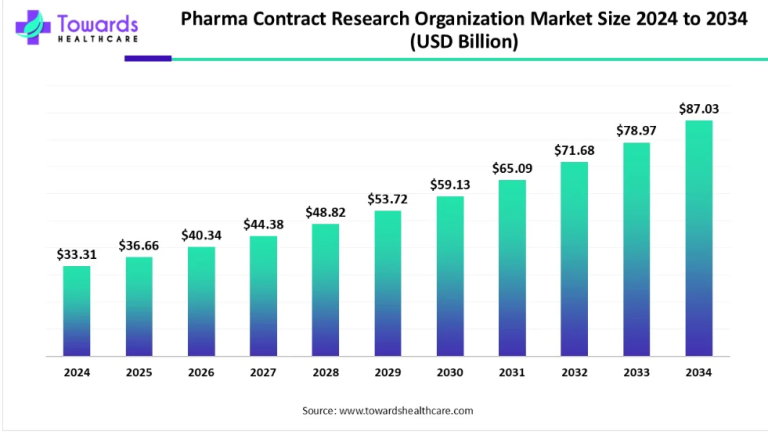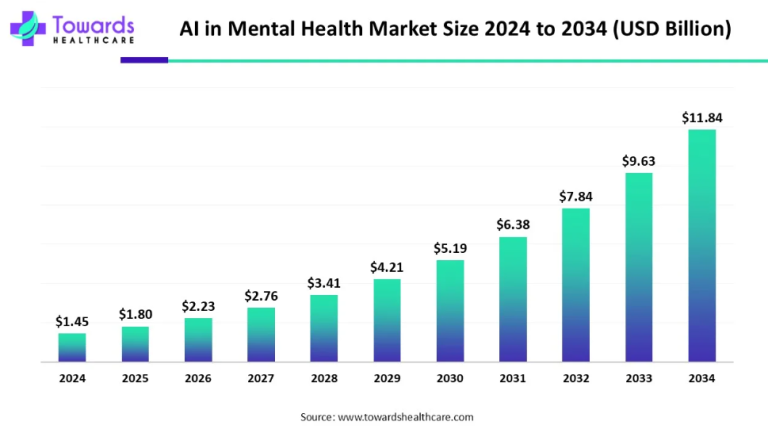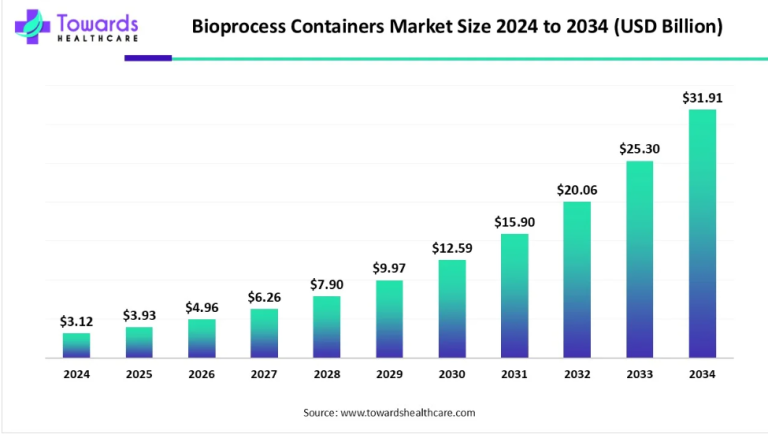In a transformative era for the healthcare and technology sectors, the global AI in genomics market is poised for extraordinary growth, catapulting from its 2022 valuation of USD 397.64 million. Prognosticated to surge at an impressive 23.6% Compound Annual Growth Rate (CAGR) from 2023 to 2032, the market is anticipated to achieve an estimated value of USD 7,365.59 million by the close of this period. This remarkable upswing is primarily attributed to the burgeoning cross-industry collaborations and the escalating focus on Research and Development (R&D).
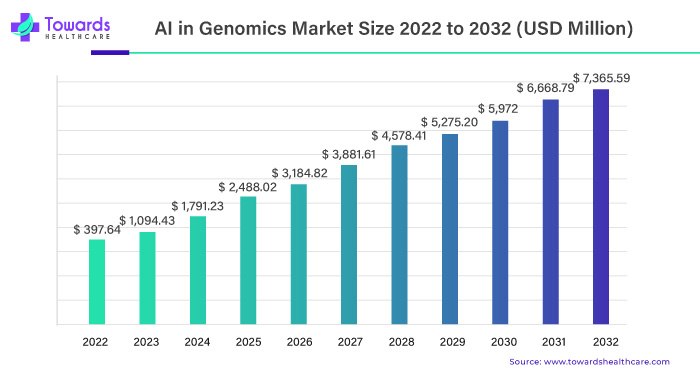
The field of genomics has witnessed a significant revolution with the integration of Artificial Intelligence (AI) technologies. AI has transformed the way we understand, analyze, and utilize genomic data, opening up new avenues for personalized medicine and healthcare advancements. The AI in Genomics market is experiencing rapid growth, driven by the increasing demand for precision medicine, advancements in AI algorithms, and the availability of large-scale genomic datasets. This article explores the key drivers, applications, challenges, and future prospects of AI in genomics, highlighting its transformative impact on the healthcare industry.
Embracing the AI era in genomics:
The field of genomics has been revolutionized by the integration of artificial intelligence (AI) technologies. AI in genomics combines the power of advanced algorithms and machine learning techniques with large-scale genomic data to unlock new insights into the human genome and drive advancements in personalized medicine. AI in the (READ MORE) genomics market has witnessed significant growth in recent years, with a wide range of applications across research, clinical diagnostics, drug discovery, and precision medicine.
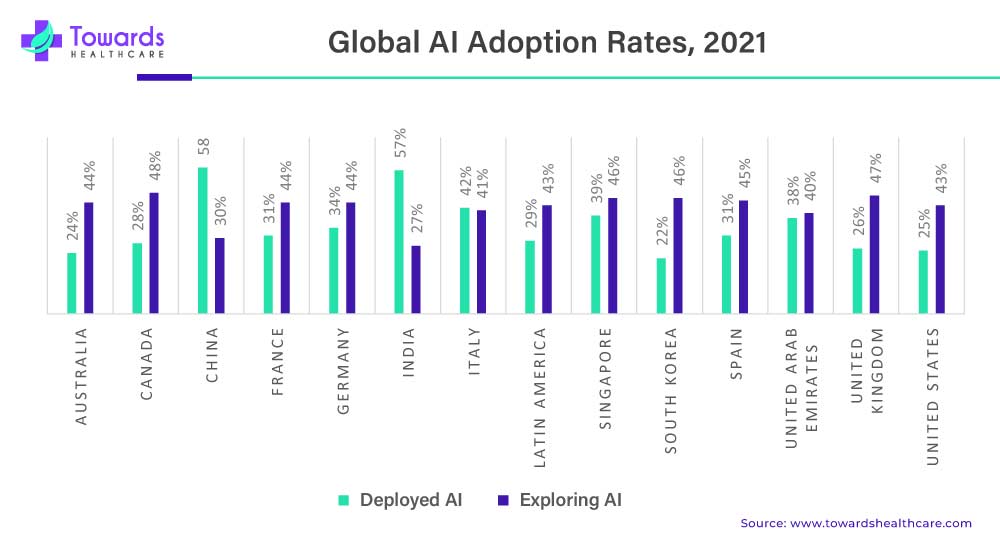
One of the prominent areas where AI has made a substantial impact in genomics is research. AI algorithms can analyze vast amounts of genomic data, identify patterns, and uncover hidden relationships between genes, genetic variations, and diseases. This has led to the discovery of novel disease biomarkers, potential therapeutic targets, and a deeper understanding of the genetic basis of complex diseases. In the field of clinical diagnostics, AI in genomics has enabled more accurate and efficient interpretation of genomic data for disease diagnosis and risk assessment. AI algorithms can analyze genetic variants, predict disease susceptibility, and provide personalized treatment recommendations based on an individual’s genomic profile. This has the potential to revolutionize healthcare by enabling tailored and precise medical interventions.
The growth of AI in genomics is also driving advancements in precision medicine. With the integration of AI technologies, healthcare providers can leverage genomic data to make informed decisions about disease prevention, diagnosis, and treatment. By considering an individual’s unique genomic profile, AI-powered precision medicine approaches can deliver more targeted and effective interventions, reducing adverse reactions and improving patient outcomes.
Understanding Genomics and AI
Genomics refers to the study of an organism’s complete set of DNA, including all of its genes. The analysis of genomic data provides valuable insights into an individual’s genetic makeup, potential disease risks, and response to specific treatments. However, the sheer volume and complexity of genomic data present challenges in extracting meaningful information. This is where AI comes into play.
AI, specifically machine learning algorithms, enables the analysis of extensive genomic datasets with speed, accuracy, and efficiency. By training algorithms on large datasets, AI models can identify patterns, detect genetic variations, and make predictions based on genomic data. This integration of AI in genomics has paved the way for personalized medicine, targeted therapies, and improved patient outcomes.
Key Drivers of AI in Genomics Market
1. Precision Medicine and Personalized Healthcare
Precision medicine aims to deliver tailored medical treatments based on an individual’s genetic makeup, lifestyle, and environmental factors. AI in genomics plays a crucial role in identifying genetic variations associated with diseases, predicting treatment response, and guiding personalized treatment plans. This approach enhances the efficacy and safety of medical interventions, reducing the trial-and-error approach in healthcare.
2. Advancements in AI Algorithms
The rapid advancements in AI algorithms, particularly in the field of machine learning, have fueled the growth of AI in genomics. Deep learning algorithms, such as convolutional neural networks and recurrent neural networks, have shown remarkable capabilities in analyzing genomic data, identifying patterns, and predicting disease outcomes. These algorithms can process large-scale genomic datasets, uncover hidden associations, and provide valuable insights for research and clinical applications.
3. Availability of Large-Scale Genomic Datasets
The availability of large-scale genomic datasets, such as The Cancer Genome Atlas (TCGA) and the UK Biobank, has provided researchers and AI developers with a wealth of data to train and validate AI models. These datasets encompass genomic information from diverse populations, enabling the development of robust AI algorithms that can handle genetic variations across different ethnicities. The integration of such datasets with AI algorithms has accelerated the pace of genomics research and personalized medicine.
4. Improved Data Storage and Processing Capabilities
The advancements in data storage and processing technologies have facilitated the integration of AI in genomics. High-performance computing, cloud-based storage, and distributed computing frameworks have made it possible to handle and analyze vast amounts of genomic data efficiently. This scalability and accessibility of computational resources have empowered researchers and healthcare professionals to leverage AI in genomics for a wide range of applications.
Applications of AI in Genomics
The integration of AI in genomics has revolutionized various aspects of healthcare, from disease diagnosis and treatment selection to drug discovery and genomic research. Here are some key applications of AI in genomics:
1. Disease Diagnosis and Prognosis
AI algorithms can analyze genomic data to identify genetic variations associated with specific diseases. By comparing an individual’s genomic profile with known disease-related variations, AI models can predict disease risks, assist in early diagnosis, and provide personalized prognosis. This enables healthcare professionals to develop targeted treatment plans and interventions.
2. Drug Discovery and Development
The process of drug discovery and development can be time-consuming, expensive, and prone to failures. AI in genomics has the potential to accelerate and optimize this process. AI algorithms can analyze genomic data to identify potential drug targets, predict drug responses, and guide the development of novel therapies. This approach enhances the efficiency of drug discovery, reduces costs, and improves the success rate of clinical trials.
3. Precision Oncology
Cancer genomics has been a primary focus of AI applications in healthcare. AI algorithms can analyze genomic data from cancer patients to identify specific genetic alterations, predict tumor behavior, and guide treatment decisions. Precision oncology, enabled by AI in genomics, allows for personalized cancer treatments based on the individual’s genomic profile, improving treatment outcomes and minimizing side effects.
4. Genetic Counseling and Family Planning
AI in genomics can provide valuable insights into an individual’s genetic predisposition to inherited diseases. Genetic counseling, combined with AI analysis of genomic data, helps individuals and families understand their risks of passing on genetic conditions to future generations. This information enables informed decision-making regarding family planning, prenatal testing, and reproductive choices.
5. Genomic Research and Public Health
The integration of AI in genomics has accelerated genomic research and population-level studies. AI algorithms can analyze large-scale genomic datasets to identify genetic variations associated with complex diseases, uncover population-level patterns, and contribute to public health initiatives. This knowledge can aid in developing preventive strategies, understanding disease epidemiology, and improving healthcare policies.
Challenges and Future Prospects
While AI in genomics holds immense potential, several challenges need to be addressed for its widespread adoption and impact.
1. Data Privacy and Security
Genomic data is highly sensitive and personal. Protecting patient privacy and ensuring data security are critical considerations in AI in genomics. Robust data encryption, secure storage infrastructure, and stringent access controls are essential to maintain patient confidentiality and prevent unauthorized use of genomic data.
2. Interpretability and Transparency
AI algorithms often operate as black boxes, making it challenging to interpret their decision-making process. In the context of genomics, it is crucial to understand how AI models arrive at specific predictions or recommendations. Efforts are underway to develop explainable AI methods that provide transparency and interpretability, enabling healthcare professionals to trust and validate AI-generated insights.
3. Data Bias and Representativeness
Genomic datasets used to train AI models may suffer from data bias and lack representativeness, particularly when it comes to diverse populations. To ensure equitable and unbiased AI applications in genomics, efforts should be made to include diverse populations in genomic research and improve the representativeness of datasets used for AI training.
4. Integration into Clinical Practice
The successful integration of AI in genomics into routine clinical practice requires addressing several implementation challenges. These include regulatory considerations, standardization of AI algorithms, integration with electronic health records, and clinician training. Collaborations between AI developers, healthcare professionals, and regulatory bodies are essential to overcome these challenges and ensure the seamless integration of AI in genomics into healthcare workflows.
Looking ahead, the future prospects of AI in genomics are promising. Continued advancements in AI algorithms, increased availability of genomic datasets, and improved data storage and processing capabilities will further enhance the capabilities of AI in genomics. Integration with other emerging technologies, such as blockchain for secure data sharing and federated learning for privacy-preserving AI, will drive the next phase of innovation in AI in genomics.
From Data to Insights: Overcoming Data Quality and Standardization Barriers in AI Genomics
One of the key restraints in the AI in genomics market is the challenge of data quality and standardization. Genomic data is complex and heterogeneous, often originating from different sources and generated using various platforms and technologies. This variability in data formats, quality, and standards poses significant challenges for AI algorithms and analysis pipelines. Several aspects related to data quality and standardization can hinder the progress of AI in genomics market.
Genomic data can exhibit significant variability due to differences in sequencing technologies, sample preparation methods, and data generation protocols. This variability can affect the performance and generalizability of AI algorithms, making it challenging to draw accurate conclusions from the data. In addition, genomic data is prone to errors, including sequencing errors, alignment errors, and variant calling errors. These errors can impact the reliability and accuracy of AI models trained on such data. Moreover, incomplete or missing data can introduce biases and affect the robustness of AI algorithms.
Furthermore, genomic data is often stored in various file formats, such as FASTQ, BAM, VCF, and others. The absence of standardized formats across different sequencing platforms and analysis tools can make it difficult to integrate and compare data from different sources. It requires additional preprocessing and harmonization steps to ensure compatibility and interoperability. Interpreting genomic data requires accurate and up-to-date annotations that link genomic variants to relevant biological information and disease associations. However, the annotation of genomic data is an ongoing process, and new discoveries continually emerge. The lack of standardized and comprehensive annotation resources can impact the interpretation and utilization of genomic data in AI applications.
Moreover, genomic data is highly sensitive and contains personal health information. Ensuring data privacy, security, and compliance with ethical guidelines are paramount in genomic research and AI applications. These concerns can limit the availability and sharing of high-quality genomic data, which is essential for training robust AI models.
Addressing these challenges requires concerted efforts from researchers, clinicians, and regulatory bodies. Here are some potential strategies to improve data quality and standardization in AI-driven genomics:
- Standardization Efforts: Establishing standardized data formats, protocols, and quality control measures can enhance data interoperability and comparability across different genomic datasets and platforms. Initiatives like the Global Alliance for Genomics and Health (GA4GH) aim to develop standards and best practices for genomic data sharing and analysis.
- Data Quality Control: Implementing rigorous quality control measures during data generation, processing, and analysis can help identify and mitigate data quality issues. Standardized quality control metrics and guidelines can assist in identifying and filtering out low-quality data points.
- Data Sharing and Collaboration: Encouraging data sharing and collaboration among researchers, institutions, and organizations can facilitate the pooling of large-scale, high-quality genomic datasets. This sharing promotes data harmonization, enables benchmarking of AI models, and improves the generalizability of AI algorithms.
- Improved Annotation Resources: Continued efforts to enhance genomic annotation resources and databases can support accurate interpretation and analysis of genomic data. Collaborative initiatives to curate and update annotation databases can ensure that AI algorithms have access to comprehensive and reliable information.
- Regulatory Frameworks: Developing and implementing regulatory frameworks that address data privacy, security, and ethical considerations can foster responsible data sharing and utilization in AI-driven genomics. Ensuring compliance with regulations and guidelines can build trust and facilitate the responsible use of genomic data.
By addressing data quality and standardization challenges, the AI in genomics market can unlock its full potential in transforming healthcare, enabling personalized medicine, and advancing our understanding of genetic diseases.
Unleashing the Power of AI: Seizing the Opportunity in Genomics with Next-Generation Sequencing (NGS)
The field of genomics has experienced a significant transformation with the advent of Next-Generation Sequencing (NGS) technologies. These advanced sequencing platforms have enabled the generation of vast amounts of genomic data, opening up new opportunities for AI applications in genomics. The combination of NGS and AI has the potential to revolutionize various aspects of genomics research, diagnosis, and personalized medicine.
NGS generates massive datasets that require sophisticated analysis methods to extract meaningful insights. AI algorithms, such as machine learning and deep learning, can process and analyze these large-scale datasets, uncovering hidden patterns, identifying genetic variants, and predicting disease outcomes. AI-driven data analysis accelerates the discovery of novel genetic markers, biomarkers, and therapeutic targets, leading to advancements in disease understanding and treatment. In addition, NGS combined with AI holds immense potential for advancing precision medicine.
By analyzing an individual’s genomic data, AI algorithms can identify specific genetic variations that influence disease susceptibility, treatment response, and prognosis. This enables the development of personalized treatment plans tailored to an individual’s genetic profile. AI can also predict drug responses, identify potential adverse reactions, and guide the selection of targeted therapies, improving patient outcomes.
AI-powered analysis of NGS data can enhance diagnostic capabilities in genomics. It can aid in the identification of disease-causing mutations, genetic predispositions, and hereditary conditions. AI algorithms can interpret complex genomic data and provide accurate and rapid diagnoses for various genetic disorders and cancers. This expedites the diagnostic process, enabling timely interventions and improving patient management. Furthermore, NGS data combined with AI can significantly impact drug discovery and development. AI algorithms can analyze genomic data from patient populations, identify genetic signatures associated with specific diseases, and assist in target identification and validation. This facilitates the development of more targeted therapies and improves the success rate of drug discovery programs.
AI-driven genomics can provide valuable decision-support tools for clinicians. By integrating patient-specific genomic data with AI algorithms, clinicians can make more informed treatment decisions, select appropriate therapies, and monitor treatment response. This empowers healthcare professionals to deliver personalized care, optimize treatment strategies, and improve patient outcomes. Moreover, NGS generates vast amounts of data that need to be integrated with other biomedical datasets to fully understand the complexities of human biology and disease. AI techniques can facilitate the integration of diverse datasets, such as genomic, transcriptomic, proteomic, and clinical data, enabling comprehensive analysis and knowledge discovery. AI-powered tools can uncover novel associations, biomarkers, and therapeutic targets that would be challenging to identify using traditional methods.
The integration of AI and NGS has the potential to transform genomics research, diagnosis, and patient care. It enables the extraction of valuable insights from large-scale genomic datasets, facilitates personalized medicine approaches, accelerates drug discovery, and enhances clinical decision-making. As AI continues to advance and NGS technologies become more accessible, the opportunities in genomics will continue to expand, ushering in a new era of precision healthcare.
Key Market Players:
- IBM
- NVIDIA Corporation
- Benevolent AI
- Verge Genomics
- MolecularMatch, Inc.
- SOPHiA GENETICS
- PrecisionLife Ltd.
- Lifebit
- FDNA, Inc.
- Empiric Logic
- Microsoft
- Deep Genomics
- Fabric Genomics Inc.
- Freenome Holdings, Inc.
- Cambridge Cancer Genomics
- Data4Cure Inc.
- Engine Biosciences Pte. Ltd
- Genoox Ltd.
- Diploid
- DNAnexus Inc.
Segments Covered in the Report
By Offering
- Software
- Services
By Application
- Drug Discovery & Development
- Precision Medicine
- Diagnostics
- Animal Research and Agriculture
- Others
By End User
- Pharmaceutical & Biotech Companies
- Government Organizations
- Research Organizations
- Others
By Technology
- Machine Learning
- Deep Learning
- Supervised Learning
- Reinforcement Learning
- Unsupervised Learning
- Other
- Other Technologies
By Functionality
- Genome Sequencing
- Gene Editing
- Clinical Workflows
- Predictive Genetic Testing & Preventive Medicine
By Geography
North America
- U.S.
- Canada
Europe
- U.K.
- Germany
- France
Asia-Pacific
- China
- India
- Japan
- South Korea
- Malaysia
- Philippines
Latin America
- Brazil
- Rest of Latin America
- Middle East & Africa (MEA)
- GCC
- North Africa
- South Africa
- Rest of the Middle East & Africa
Conclusion
AI in genomics is transforming healthcare by enabling personalized medicine, improving disease diagnosis and treatment, and accelerating drug discovery. The integration of AI algorithms with large-scale genomic datasets has unlocked new insights into genetic variations, disease risks, and treatment responses. While challenges remain, ongoing efforts in data privacy, interpretability, and clinical implementation are paving the way for the widespread adoption of AI in genomics. The future of healthcare lies in harnessing the power of AI to unlock the full potential of genomics and deliver precision healthcare to individuals worldwide.
